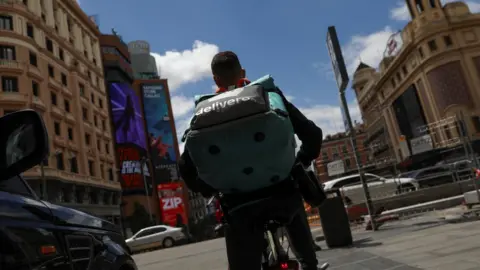Gig economy pressures make drivers 'more likely to crash'
 Reuters
ReutersDrivers and couriers who get their work from apps face a "heightened risk" of crashes, a study suggests.
Research from University College London (UCL) indicated 42% of "gig-economy" couriers and taxi drivers reported vehicle damage because of a collision.
Close to half admitted time pressure could make them break the speed limit.
Distraction by smartphones and tiredness from overwork were also flagged as risks for those delivering food and parcels.
The report draws on 200 responses to an online survey from drivers and couriers, as well as 48 in-depth interviews.
The study does not focus on any one particular company, although Uber and Deliveroo are both named as examples of companies that enable gig-economy work - where employees are not paid a salary but instead get money for each job completed.
Of those surveyed, 63% said they had not been provided with safety training on managing risks on the road, while one in 10 reported someone had been injured in a crash while they had been working.
Co-author Heather Ward said that the rise in popularity of picking up jobs through apps could "lead to an increase in risk factors affecting the health and safety" of gig-economy workers.
"As more workers enter the economy and competition rises, the number of hours they need to work and distances they must travel to earn a stable income both increase," she said.
The report indicates:
- 40% of those using an app on the job find them distracting while driving or riding
- 30% have driven through a red light while under pressure to finish a job
Uber's community guidelines advise that drivers should not text while driving and should take a break if they feel tired.
"Uber's new leadership has made safety our top priority," said a spokesman.
"We have and will continue to make changes designed to ensure drivers and couriers feel safe and supported on every moment of their journey."
In January, Uber introduced a new policy on drivers' hours in the UK, obliging drivers to take an uninterrupted six-hour break after 10 hours of driving with a passenger or travelling to pick up someone.
A spokesman for Deliveroo said the company "has led the way in putting safety at the heart of how we work with riders."
"Deliveroo has made safety equipment available to riders free of charge and we have worked with road safety campaigners to design hyper-reflective rider kit which maximises riders' visibility."
"In previous years, the UK had a good road safety record, but deregulation over the last few years has left self-employed couriers and taxi drivers at an increased risk of exploitation," said co-author Nicola Christie.
Ms Christie called for the government to heed the recommendations included in the report, which include stricter safety management and payment based on time worked rather than the drop rate of passengers or deliveries.
The research was funded by the Road Safety Trust. The charity's chief executive , Sally Lines, said that the report made for "very worrying reading and demonstrates that an enquiry into the gig economy and road safety is needed urgently".
